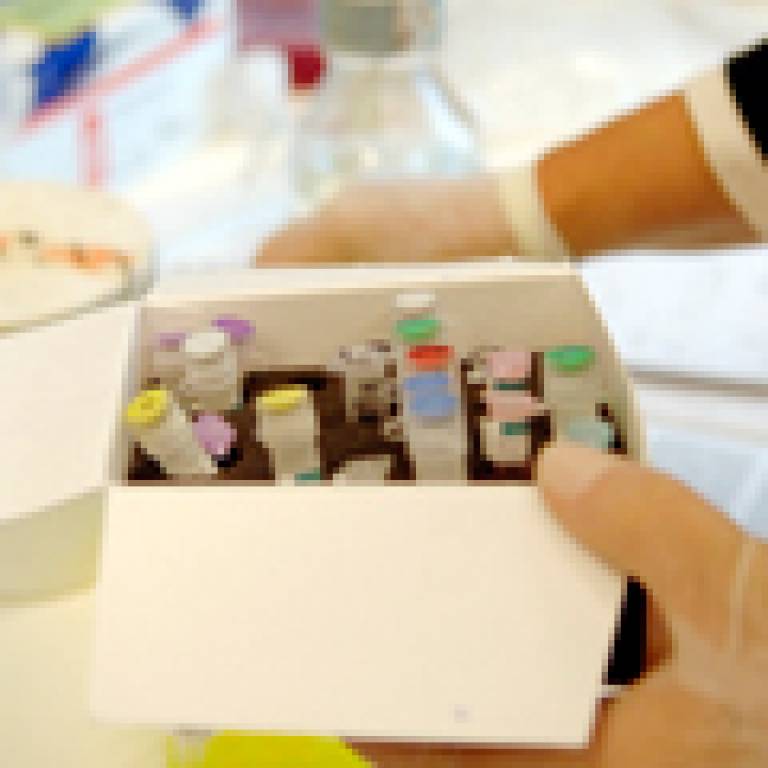UCLH/UCL research showcase
9 September 2009
Links:
 uclh.nhs.uk/" target="_self">UCLH
uclh.nhs.uk/" target="_self">UCLH
UCLH and UCL will showcase their research work during an open event in London on September 17.
The event will present some of the pioneering research work ahead of the second anniversary of the UCLH/UCL National Institute for Health Research Comprehensive Biomedical Research Centre (CBRC). The centre has been at the forefront of research into some of the major causes of illness and disease-related deaths since it was established in 2007.
Research highlights will include transplanting stem cells found in the nose to potentially heal nerve and spinal injuries; a new non-invasive procedure that could reduce the severity of heart attack; using gum disease as an indicator of other health problems and exploring the use of gene therapy to treat severe fetal growth restriction.
Professor Ian Jacobs, Director of the CBRC, said: "Our open event is an opportunity to showcase some of the pioneering research at UCLH/UCL which has led to UCL being the most cited research institution in the UK. Our research team shares a determination to work collaboratively to translate research progress in to advances in health care. Since its creation, the centre has focused on a range of advances in medical research that will have a direct impact on patients' care and quality of life, and will also save many lives. These include cancer, cardiac disease, infectious disease, women's health, oral health and neurological diseases such as epilepsy, stroke and multiple sclerosis."
Professor Dame Sally Davies, Director General of Research and Development at the Department of Health the National Institute for Health Research (NIHR) said: "The variety and scope of research to be showcased at this event is an excellent example of what NIHR hoped to achieve when establishing the biomedical research centres across the nation. It demonstrates how the strategy is evolving and shows our original vision in action: how joint-working between NHS and university staff has been made easier, how existing collaborations have been strengthened and new ones formed, and an increased ability overall to build on basic research and translate it into real and tangible benefits for patients."
The centre is one of five funded by the Department of Health's National Institute for Health Research (NIHR) and enables UCLH and UCL to train the next generation of leading researchers. A key component is the collaborative approach between UCLH and UCL to bring together the work of hundreds of scientists, doctors, nurses and allied health professionals.
The conference will be held on Thursday 17 September 2009 in the UCL Cruciform Building, Gower Street London, WC1E 6BT from 8:30am until 5pm. To register, please call 0845 054 8422 or email event.reg@expotel.com
UCL context
In March 2009, UCL Partners was designated as one of the UK's first academic health science centres (AHSC), strengthening UCL's position as Europe's leading health research powerhouse. UCLP is UCL's partnership with four of London's biggest and best known hospitals and research centres: Great Ormond Street Hospital for Children NHS Trust (GOSH); Moorfields Eye Hospital NHS Foundation Trust; the Royal Free Hampstead NHS Trust; and UCL Hospitals NHS Foundation Trust.
As well as the NIHR Comprehensive Biomedical Research Centre, UCL also incorporates two Specialist Biomedical Research Centres - one for work carried out by the UCL Institute of Child Health/GOSH and one for the UCL Institute of Ophthalmology/Moorfields Eye Hospital NHS Foundation Trust
About UCLH
University College London Hospitals NHS Foundation Trust (UCLH), situated in the West End of London, is one of the largest NHS trusts in the United Kingdom and provides first class acute and specialist services.
The new state-of-the-art University College Hospital which opened in 2005, is the focal point of the trust alongside five cutting-edge specialist hospitals.
The Trust is committed to research and development and forms part of UCL Partners which in March 2009 was officially designated as one of the UK's first academic health science centres by the Department of Health.
Related news
UCL Partners is one of UK's first Academic Health Science Centres
 Close
Close

